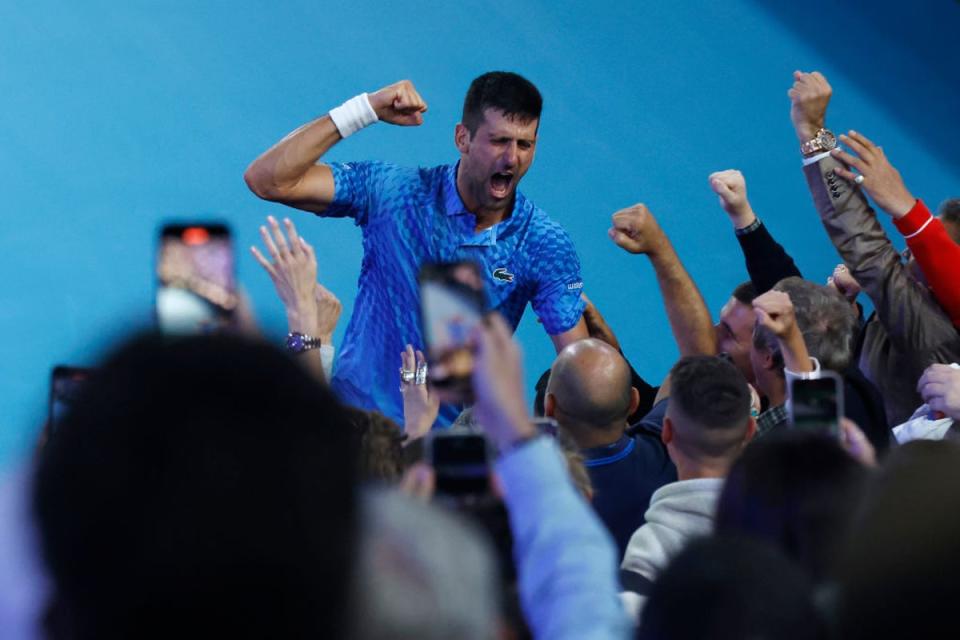Novak Djokovic defeats Stefanos Tsitsipas to win 10th Australian Open and 22nd grand slam title

If the emotion of the celebration did not say it all, the words soon confirmed it. “This is the biggest victory of my life,” Novak Djokovic said, and he wasn’t talking about the numbers. Those were historic: a record-extending 10th Australian Open title, a men’s record-equaling 22nd grand slam, but it was not the pursuit of records that left Djokovic sobbing uncontrollably into his towel and gulping for air by the end.
Djokovic has not played the villain on his return to Australia, a year on from his dramatic deportation ahead of last season’s tournament. He has not needed to, but it was only at the very end that he revealed these have been the hardest four weeks of his life. To add to the pressure, he had to battle a hamstring injury during the early rounds, as well as accusations that he was faking the injury in order to get an edge over his opponents. His father’s brush with pro-Russian demonstrators earlier this week increased the tension, which was beginning to spill out onto the court.
And so in Sunday’s final, in the face of everything else Djokovic has had to overcome since his arrival, the fleeting challenge of Stefanos Tsitsipas was just a mere obstacle. The Greek, who had been an image of confidence and positivity throughout his two weeks in Melbourne, had been swiftly subdued in the first set and even when he stood with a set point to level the match, Djokovic barely flinched. With the finish line in sight, Djokovic closed the door, leading to an unprecedented emotional release from the 35-year-old Serbian after winning his third championship point.

A historic title and triumphant comeback moves him level with Rafael Nadal in the grand slam race, while extending his remarkable form in Melbourne Park. Now with 28 consecutive wins, he has not been beaten at the Australian Open in five years, and has won all of his 10 final appearances on the Rod Laver Arena. Attempting to overturn that record was the formidable task facing Tsitsipas but the 24-year-old had chances in what was his second grand slam final appearance, particularly at the end of the second set and start of the third.
It took Tsitsipas around 50 minutes of play to get even the briefest of looks at the Djokovic serve, only to miss key volleys at the net on 15-30 in consecutive games. Tsitsipas, whose aggressive play from the baseline earlier in the tournament made the third seed a worthy finalist, hung on and edged ahead on the scoreboard behind his own improving serve, but the key mistake he made on the crucial set point at 4-5 was taking a step back in terms of his approach. Instead of attacking on the forehand side, Tsitsipas waited for Djokovic to make the mistake. Djokovic, who is air-tight on the big points, did not miss and won the tiebreak with little fuss as the Tsitsipas forehand broke down.
It was a crucial moment in the match. Djokovic had grown edgy in the second, looking to his box in wide-eyed exasperation, in a further sign of the stress he has been dealing with over the past month. After moving two sets up and into a dominant position, he steadied his game, even if Tsitsipas came out to break Djokovic for the first time at the start of the third set. Djokovic’s opponents, though, are often at their most vulnerable when they are offered a glimmer of hope and it was snatched away from Tsitsipas with an immediate break back.
From there, Djokovic did not show Tsitsipas any signs of weakness. His serve, which has long been an understated part of his game, returned to an untouchable level, routinely hitting its spots and opening up the court, allowing Djokovic to direct pressure onto the Tsitsipas backhand. Djokovic lost only one point on his first serve in the opening set. In the third, Djokovic won 17 service points in a row after the early Tsitsipas break. On the big points and into the tiebreak, Djokovic dictated the baseline rallies and Tsitsipas gave away too many errors.

The final was a contest by that stage, following on from the one-sided first set. Djokovic had jumped on Tsitsipas from the start with unerring returns deep to his backhand side and the Greek came under immediate pressure. Tsitsipas has now lost his last 10 matches against Djokovic and although he was able to loosen up on his forehand side to hit 40 winners across the match, they were outnumbered by unforced errors. That is the pressure Djokovic puts you under, though, with the Serbian’s clean hitting allowing just four unforced errors in the final set.
Djokovic’s greatest strength is often said to be how he reacts to pressure and responds to adversity. The steel of his game, along with his previous success here, was why he was welcomed back to Australia four long weeks ago, as he made a winning start to the season at the Adelaide International. After the animosity of his deportation, the reception he received upon returning to the Rod Laver Arena on the opening day of play was beyond his wildest dreams.

It seemed as if his comeback could not have been going smoother, until the uncomfortable moments began to present themselves, seemingly from all angles. “Over the last few weeks I have experienced everything, from the best to the worst of emotions,” Djokovic said. “It required huge mental energy.” Djokovic was 5-0 up in the tiebreak and in the end had to drag himself over the line, as Tstisipas rallied back and saved two championship points. Djokovic would not be denied and after everything else, it was soon perfectly clear why this title will stand above the rest.

